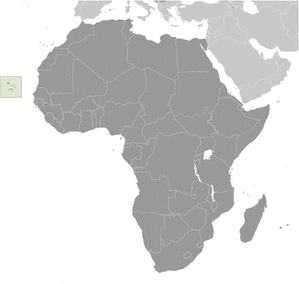Menu
CAPE VERDE
COUNTRY STATS |
PARTNERED NGONAZARENE GLOBAL MISSIONSTo stimulate a holiness revival in every community throughout West Africa, resulting in transformed believers in every local church with a passion for the lost, who are making disciples, and together, empowering new leaders to plant healthy churches.
|
HISTORY OF CAPE VERDE |
NEWS |
|
Before the arrival of Europeans, the Cape Verde Islands were uninhabited. The islands of the Cape Verde archipelago were discovered by Genoese and Portuguese navigators around 1456. According to Portuguese official records, the first discoveries were made by Genoa-born António de Noli, who was afterwards appointed governor of Cape Verde by Portuguese King Afonso V. Other navigators mentioned as contributing to discoveries in the Cape Verde archipelago are Diogo Gomes (who was with António de Noli and claimed to have been the first to land on and name Santiago island), Diogo Dias, Diogo Afonso and the Italian (Venice-born) Alvise Cadamosto.
In 1462, Portuguese settlers arrived at Santiago and founded a settlement they called Ribeira Grande (now called Cidade Velha, to avoid being confused with the town of Ribeira Grande on the Santo Antão island). Ribeira Grande was the first permanent European settlement in the tropics. In the 16th century, the archipelago prospered from the transatlantic slave trade.Pirates occasionally attacked the Portuguese settlements. Sir Francis Drake, an English corsair privateering under a Letter of marque granted by the English crown, twice sacked the (then) capital Ribeira Grande in 1585. After a French attack in 1712, the town declined in importance relative to nearby Praia, which became the capital in 1770. Decline in the slave trade in the 19th century resulted in an economic crisis. Cape Verde's early prosperity slowly vanished. However, the islands' position astride mid-Atlantic shipping lanes made Cape Verde an ideal location for re-supplying ships. Because of its excellent harbour, Mindelo (on the island of São Vicente) became an important commercial centre during the 19th century. Diplomat Edmund Roberts visited Cape Verde in 1832. With few natural resources and inadequate sustainable investment from the Portuguese, the citizens grew increasingly discontented with the colonial masters, who nevertheless refused to provide the local authorities with more autonomy. In 1951, Portugal changed Cape Verde's status from a colony to an overseas province in an attempt to blunt growing nationalism. In 1956, Amílcar Cabral and a group of fellow Cape Verdeans and Guineans organised (in Portuguese Guinea) the clandestine African Party for the Independence of Guinea and Cape Verde (PAIGC). It demanded improvement in economic, social and political conditions in Cape Verde and Portuguese Guinea and formed the basis of the two nations' independence movement. Moving its headquarters to Conakry, Guinea in 1960, the PAIGC began an armed rebellion against Portugal in 1961. Acts of sabotage eventually grew into a war in Portuguese Guinea that pitted 10,000 Soviet bloc-supported PAIGC soldiers against 35,000 Portuguese and African troops. The first national flag of Cape Verde. By 1972, the PAIGC controlled much of Portuguese Guinea despite the presence of the Portuguese troops, but the organization did not attempt to disrupt Portuguese control in Cape Verde. Portuguese Guinea declared independence in 1973 and was granted de jure independence in 1974. A budding independence movement - originally led by Amílcar Cabral, assassinated in 1973 - passed on to his half-brother Luís Cabral and culminated in independence for the archipelago in 1975. WIKIPEDIA |
|
|
NORTHERNPATH PART OF LIT INTERNATIONAL
|
NORTHERNPATH COPYRIGHT 2001-PRESENT
|
